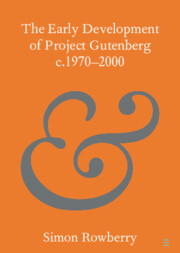2 results

The Early Development of Project Gutenberg c.1970–2000
-
- Published online:
- 15 June 2023
- Print publication:
- 29 June 2023
-
- Element
- Export citation
15 - The Politics of Representation: Narratives of Automation in Twentieth-Century American Mathematics
- from V - Research Narratives
-
-
- Book:
- Narrative Science
- Published online:
- 16 September 2022
- Print publication:
- 06 October 2022, pp 309-327
-
- Chapter
-
- You have access
- Open access
- HTML
- Export citation

